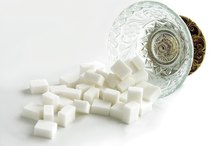What does fact checked mean?
At Healthfully, we strive to deliver objective content that is accurate and up-to-date. Our team periodically reviews articles in order to ensure content quality. The sources cited below consist of evidence from peer-reviewed journals, prominent medical organizations, academic associations, and government data.
- Medline Plus: Hepatomegaly
- PubMed: Diabetes Mellitus-Associated Glycogen Storage Hepatomegaly
- PubMed: Diabetes Mellitus-Associated Glycogen Storage Hepatomegaly
- Medline Plus: Fish Oil
The information contained on this site is for informational purposes only, and should not be used as a substitute for the advice of a professional health care provider. Please check with the appropriate physician regarding health questions and concerns. Although we strive to deliver accurate and up-to-date information, no guarantee to that effect is made.
Hepatomegaly means "enlarged liver." Dietary changes can sometimes help manage this condition, depending on the cause of the enlargement 1. The liver aids in digestion, produces important blood proteins and cleans the body of toxins. An enlarged liver may not function properly, so dietary changes intended to manage the problem will reduce strain on the organ or aid it in its functions.
If you are experiencing serious medical symptoms, seek emergency treatment immediately.
Causes of Hepatomegaly
Several underlying diseases and conditions can cause an enlarged liver. According to the National Institutes of Health, these range from liver cancer and leukemia to viral diseases such as hepatitis A and hepatitis B. Three potential causes of hepatomegaly have a diet connection 1. Poorly managed diabetes forces the liver to store excessive glycogen, which can result in liver disease. The ingestion of large quantities of fatty foods can result in multiple fatty deposits on the liver. Alcohol use can cause cirrhotic scarring and liver enlargement. Changes in diet can have a beneficial effect on all three of these causes of hepatomegaly 1.
Fatty Food-Related Hepatomegaly
Diet for Alcoholic Liver Disease
Learn More
In the case of a liver enlarged with fatty deposits, a person can reduce hepatomegaly by cutting fatty foods out of his diet, especially foods that contain saturated or trans fats 1. These foods include fatty meats, cheeses and many types of processed snack foods. According to the National Institutes of Health, consumption of certain unsaturated fatty acids, such as fish oil, can reduce the concentration of triglycerides in the blood and thus help stop and reverse the process of liver enlargement. You can obtain dietary fish oil from fatty fishes like salmon, or take it in capsule form as a supplement.
- In the case of a liver enlarged with fatty deposits, a person can reduce hepatomegaly by cutting fatty foods out of his diet, especially foods that contain saturated or trans fats 1.
Diabetes-Related Hepatomegaly
A person with diabetes who relies too heavily on insulin to control her blood sugar bears an increased risk of developing liver enlargement. A small study carried out by M. Nakamuta and colleagues at an internal medicine facility in Japan suggests that such cases of hepatomegaly can be brought under control with a calorie-restricted diet and more conservative use of insulin 1. The study report in the July 1993 issue of the journal "Fukuoka Igaku Zasshi" suggests that patients try to restrict their insulin use to as little as 15 to 20 units per day, and stop overeating because it causes blood sugar spiking. Avoiding foods that spike the blood sugar even in small quantities, such as refined sugar, flour and simple starches, helps to reduce insulin dependence. People with diabetes can replace these foods with foods that have low glycemic index values -- numbers that reflect the effect of food on a person's blood sugar -- such as whole grains, which offer primarily complex carbohydrates, unsaturated fats and protein.
- A person with diabetes who relies too heavily on insulin to control her blood sugar bears an increased risk of developing liver enlargement.
- People with diabetes can replace these foods with foods that have low glycemic index values -- numbers that reflect the effect of food on a person's blood sugar -- such as whole grains, which offer primarily complex carbohydrates, unsaturated fats and protein.
Alcohol-Induced Hepatomegaly
Can I Eat Certain Foods to Reduce My Swollen Liver?
Learn More
Alcohol abuse severely impairs liver function. Specific dietary changes for people with alcohol-induced hepatomegaly can help manage its symptoms 1. Eliminating alcohol, the primary agent of disease, will greatly reduce stress on the liver and effectively halt scarring. The consumption of high-quality, lean animal protein can help an impaired liver perform its protein digestion and formation functions more efficiently. Swelling of the extremities may result if the liver does not get adequate high-quality protein. Reducing salt intake will help manage water retention. The University of Maryland Medical center recommends that patients with cirrhosis avoid eating shellfish, since certain kinds may carry Vibrio vulnificus bacteria, which presents health risks to people with cirrhosis 2.
Considerations
Since the causes of hepatomegaly vary, no single set of dietary changes will solve the problem for all who have it 1. Because of the complexity of the issue, speak to your health care provider before embarking on any dietary changes if you have this condition. Be sure to tell your doctor about all medications, herbal supplements or vitamins you take to avoid interactions.
Related Articles
References
- Medline Plus: Hepatomegaly
- University of Maryland Medical Center: Cirrhosis
- PubMed: Diabetes Mellitus-Associated Glycogen Storage Hepatomegaly
- Cleveland Clinic. Enlarged Liver. Updated September 7, 2018.
- Centers for Disease Control and Prevention. What is Viral Hepatitis? Updated
- Centers for Disease Control and Prevention. Enlarged Liver: Diagnosis and Tests. Updated September 7, 2018.
- Nassir F, Rector RS, Hammoud GM, Ibdah JA. Pathogenesis and Prevention of Hepatic Steatosis. Gastroenterol Hepatol (N Y). 2015;11(3):167–175.
- Merck Manual Professional Version. Alcoholic Liver Disease. Updated July 2019.
- Madrazo BL. Using imaging studies to differentiate among benign liver tumors. Gastroenterol Hepatol (N Y). 2010;6(7):423–427.
- Cong WM, Bu H, Chen J, et al. Practice guidelines for the pathological diagnosis of primary liver cancer: 2015 update. World J Gastroenterol. 2016;22(42):9279–9287. doi:10.3748/wjg.v22.i42.9279
- Memorial Sloan Kettering Cancer Center. Liver Metastases (Secondary Liver Cancer). Updated
- Cleveland Clinic. Glycogen Storage Disease (GSD). Updated August 2, 2019.
Writer Bio
Tim Banas started writing professionally in 2009 after teaching high school science for seven years. He has since written and edited for various online publications including Demand Studios, FYILiving.com, Tree.com and BinaryOption.com. He has a Master of Science in biology from Southern Illinois University.









